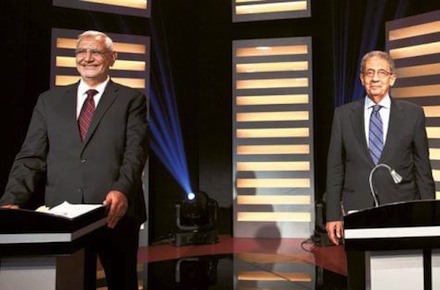Egyptians go to the polls today and tomorrow to cast votes in a presidential election unprecedented in not only Egypt, but the Middle East.
Since the disqualification of three of the top candidates just one month ago, the bumpy race has settled into a vibe that has electrified the 82 million citizens of the world’s largest Arab nation, the latest and, perhaps, greatest act in a drama that began with the protests in Cairo’s Tahrir Square that led to the downfall of longtime strongman Hosni Mubarak in February 2011. ![]()
Polls have shown any number of candidates in the lead, and two weeks ago, two of the presumed frontrunners, Amr Moussa (above, right) and Abdel Moneim Aboul Fotouh (above, left), sparred in Egypt’s first-ever presidential debate. But they are not the only candidates with a chance to win the presidency.
The truth is that, for all the interest — both in Egypt and abroad — no one knows who will emerge as Egypt’s next president (which is in itself a fascinating statement on the success Egypt’s democratic transition). The only safe prediction is that this week’s vote will result in no candidate winning over 50% of the vote, necessitating a runoff among the top two winners on June 16 and 17.
Any of the top five candidates could advance to the runoff — including also Mohammed Morsi, Hamdeen Sabahi and Ahmed Shafiq: Continue reading Abdoul Fatouh v. Moussa v. Morsi v. Sabahi v. Shafiq: five vie for two runoff slots in unpredictable Egyptian race

